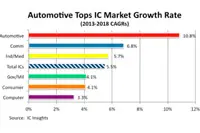Electronics News
Archive : 20 November 2014 год
 Qualcomm has announced plans to develop ARM based chips targeted at the burgeoning market for data centres. Company CEO Steve Mollenkopf, pictured, said at its latest investor meeting the server market is 'an interesting opportunity' and will be worth more than $15billion a year by 2020. "We will have a server product," he said. "Qualcomm's road map at the high end is merging with what is feasible to put into a data centre."
Qualcomm has announced plans to develop ARM based chips targeted at the burgeoning market for data centres. Company CEO Steve Mollenkopf, pictured, said at its latest investor meeting the server market is 'an interesting opportunity' and will be worth more than $15billion a year by 2020. "We will have a server product," he said. "Qualcomm's road map at the high end is merging with what is feasible to put into a data centre."
Mollenkopf believes that, because of its expertise in the mobile market, Qualcomm is in a 'unique position' to address the server sector as one of the few companies to use ARM technology on leading edge processes.
"Growth in the data centre is being driven by companies who design their own data centres and who want alternatives; new architectures," he contended. "We are engaged with customers, but it will take a while to build this business. It's an interesting opportunity."
Author
Graham Pitcher
Source: www.newelectronics.co.uk
 While flash memory is a widely used storage medium, manufacturers are facing challenges when it comes to making the devices on leading edge processes. Although flash manufacturers are looking to 3D arrangements to avoid these problems, researchers from the University of Glasgow and Rovira I Virgili University in Spain believe molecular electronics could be another useful solution.
While flash memory is a widely used storage medium, manufacturers are facing challenges when it comes to making the devices on leading edge processes. Although flash manufacturers are looking to 3D arrangements to avoid these problems, researchers from the University of Glasgow and Rovira I Virgili University in Spain believe molecular electronics could be another useful solution.
Scientists have previously suggested that individual molecules could be used to replace conventional data storage components. However, attempts to design these molecules have faced significant practical barriers such as low thermal stability and high resistance, which has limited their use in pre existing technologies.
Looking to overcome these problems, the research team has developed a possible solution based on metal oxide clusters called polyoxometalates (POMs).
Professor Lee Cronin, Regius Professor of Chemistry at the University of Glasgow, led the research team. He said: "Conventional flash memory uses transistors whose design allows them to 'remember' whether they have been turned on or off after they've been removed from a power source. Those transistors' positions correspond to binary, allowing data to be stored.
"We've been able to design, synthesise and characterise POM molecules that can trap charge and act as flash ram, as well as dope the inner core of the clusters with selenium to create a new type of memory we call 'write-once-erase'.
According to Prof Cronin, while the POM clusters provide a balance of structural stability and electronic activity, it is also possible to tune their electronic functionality. "One major benefit of the POMs we've created is that it's possible to fabricate them with devices which are already widely-used in industry, so they can be adopted as new forms of flash memory without requiring production lines to be overhauled."
Author
Graham Pitcher
Source: www.newelectronics.co.uk
 The automotive IC market is forecast to experience the highest annual growth rate of the six major end use applications for ICs during the next few years.
The automotive IC market is forecast to experience the highest annual growth rate of the six major end use applications for ICs during the next few years.
Between now and 2018, the sector is expected to experience growth of 10.8%, four percentage points greater than the next closest category – communications – at 6.8% and ahead of the 5.5% anticipated growth for the total IC market during this time.
According to IC Insights, this is partly due to the fact that the market is growing from a smaller base compared to the communications, computer, and consumer segments, and partly because a steady and significant increase in IC content is expected on board all new cars.
This year, the total automotive IC market is expected to grow by 15% to reach $21.7billion, compared to a more modest increase of just 1% in 2013. In addition, the automotive memory IC market is forecast to more than double from an estimated $2.0bn in 2014 to $4.2bn in 2018.
Author
Laura Hopperton
Source: www.newelectronics.co.uk

